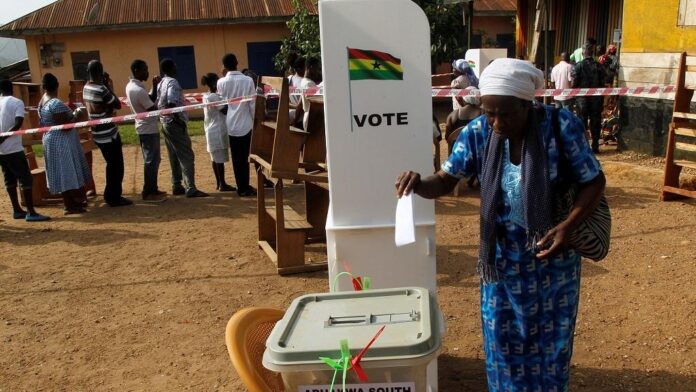With exactly 98 days to the 2024 general election, the National Peace Council (NPC) has called on the leaders of the youth wing of political parties to channel their youthful energies to peacebuilding within the political space to help consolidate the country’s democratic governance.
The council said the December 7 polls would be a litmus test of the resilience of the country’s democracy, and as such required that youth leaders of political parties refrained from activities and utterances that could disrupt the peace of the country.
A member of the NPC, Joana Adzoa Opare, who made the call, stressed that for Ghana to maintain its position as the beacon of democracy for Africa, the youth who constituted over 56 per cent of the voter population must conduct their political activities in a peaceful manner.
“As young people, let us remember that Ghana must remain Ghana, an enviable and peaceful country after the 2024 elections,” she stressed.
Conference
Mrs Opare made the call at a national youth party leaders’ conference on peaceful elections in Accra yesterday.
The NPC organised the conference in collaboration with the International Republican Institute (IRI), the National Democratic Institute (NDI), the Consortium for Elections and Political Process Strengthening (CEPPS) and the International Foundation for Electoral Systems (IFES).
Key state institutions that participated in the forum were the Electoral Commission (EC), National Commission for Civic Education (NCCE) and the National Media Commission (NMC).
The conference brought together the national and regional youth organisers of the two main political parties – National Democratic Congress (NDC) and the New Patriotic Party (NPP) as well as youth activists of other political parties.
Among key issues discussed at the conference were the role of youth organisers of political parties in peaceful political campaigns; promoting youth participation and representation in party politics and governance, and curbing misinformation, disinformation and mal-information on social media.
The Head of Monitoring and Evaluation at the West Africa Network for Peacebuilding (WANEP), Dr Vincent Azumah, said there was ample evidence that some parts of the country could witness electoral violence this year if care was not taken.
He revealed that as part of WANEP’s Election Monitoring and Violence Mitigation Project, more than 200 constituencies had been identified as hotspots in this year’s election.
Dr Azumah said the assessment showed that 29 constituencies, representing 10 per cent of the constituencies, were very high risk areas for violence, while 30 others had been classified as high risk.
He said 106 constituencies were at medium risk of election violence, with 53 others classified as low risk.
“What that means is that these are the constituencies that may have some conflicts, violence or even some deaths if we do not respond to what this assessment is saying,” he said.
Dr Azumah explained that the hotspots were assessed using indicators such as the previous history of violence, the candidates in the area and how they compared to each other; and incidents of land disputes and chieftaincy disputes.
He added that the hotspots were subject to change for better or for worse depending on how security agencies, political parties and other stakeholders in the electoral process conducted their activities.
The peacebuilding practitioner said it was against that backdrop that the conference on peaceful elections organised for political party youth organisers was crucial.
He stated that since the youth were the pivot around which boisterous activities of political parties revolved, it was important to engage them to ensure peaceful elections.
“It is important for the young people who are politically active to know that election periods or campaign seasons are not the time for beating war drums. Tension is already high and there are issues that we are already grappling with in these communities, so if you bring the political tensions again, it exacerbates the trouble in these areas,” he said.
Dr Azumah added that in an era when issues of climate change were making livelihood difficult in some of parts of the country and tensions were already brewing because of terrorist activities, political conflicts would make the country extremely difficult to live in.
No attacks
WANEP’s Head of Monitoring and Evaluation entreated the youth to stay away from the temptation to prevent other actors in the political space from carrying out their activities as that was a major cause of electoral conflict and violence.
In particular, Mr Azumah said the youth activists of political parties must desist from attacking journalists who covered elections.
He said obstructing or attacking journalists who were the voices of the people during elections was inimical to consolidating the country’s democracy.
“To avoid political conflict, it is important that you do not prevent other political parties from going about their activities; do not deface other political parties’ posters or allow your supporters to prohibit others from supporting other parties,” WANEP’s Head of Monitoring and Evaluation stated.
Dr Azumah also underscored the need for political parties, particularly the youth, to stay away from procuring votes either forcefully or by buying, as such tendencies was a blot on democracy and gave rise to conflicts.
EC committed
In a speech delivered on his behalf at the conference, the Deputy Chairman of the EC in charge of Operations, Samuel Tettey, assured Ghanaians that the Commission was committed to the principles of delivering transparent, free and fair elections that would be acceptable by all parties.
He commended the NPC and its partners for organising the conference to engage youth organisers of the political parties.
Mr Tettey said interparty dialogues and responsible communication by young party activists were key to ensuring peaceful elections.
“Posterity will not forgive youth leaders of political parties if they allow themselves to be used as agents of destruction. The youth constitute 56 per cent of the voter population with over 650,000 of them being first time voters,” the EC Deputy Chairperson added.
Source: graphic.com.gh


